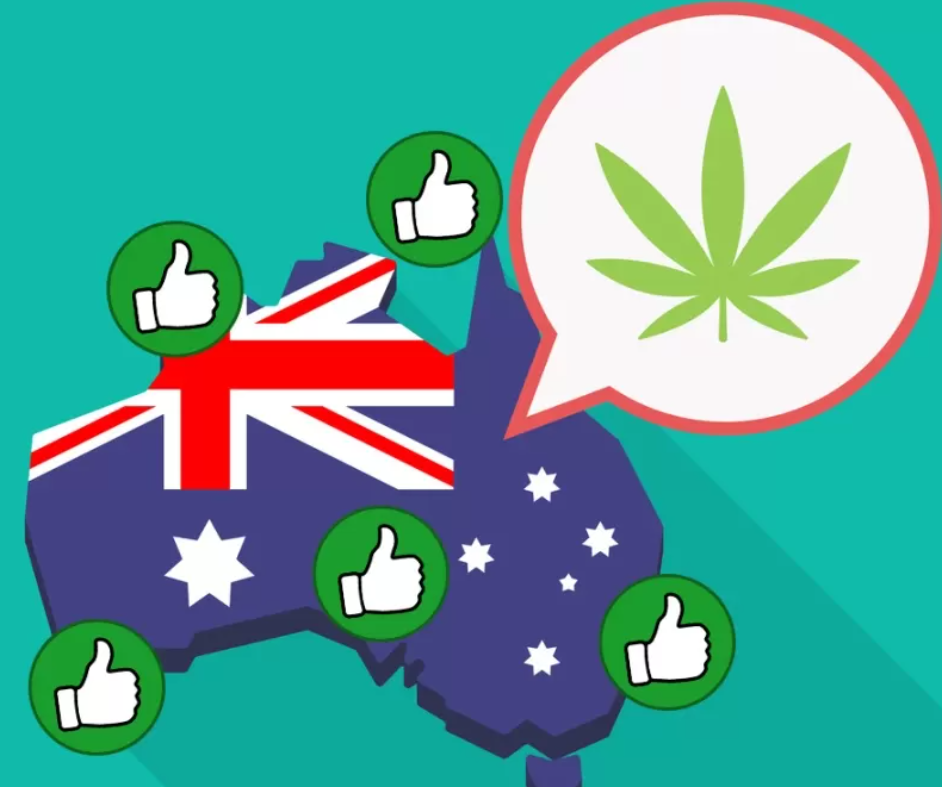Reports
Australians Support Cannabis More Than Tobacco for the First Time in History According to a New Poll

New Poll Shows Australians Support Cannabis More Than Tobacco For The First Time In History
Attitudes around marijuana are changing all around the globe, which is fantastic news for people everywhere.
Now, even Down Under, more Australians are supporting cannabis compared to tobacco for the first time ever in history. The Australian government has made drug law reforms so that there is significantly less stigma around the drug, enabling more people to access the medicine that they need.
The results of a 2019 survey have just been released by the Australian Institute of Health and Welfare, asking 20,000 people over the age of 14 about their opinion on drug. They found that 20% of participants said they support cannabis use, a five-percent increase more compared to those who support tobacco – a record-breaking change. Additionally, support for marijuana legalization increased 16% from 2010 while 41% supported legalization, and 37% were opposed to it.
Around 4 in 5 respondents said that they wouldn’t use cannabis even if it was legalized but the ratio of people who would use cannabis if it was legal jumped from 5.3% in 2010 up to 9.5% in 2019.
The data also revealed the support for marijuana legalization was highest among the major cities in Australia including Sydney, Melbourne, and Brisbane. The highest ratio of support was found in Canberra, where 66% of respondents favored legalization, not surprising given the liberal approach the Australian Capital Territory is known for when it comes to marijuana policy.
Similar findings were revealed in a survey whose results were published on December 2021. Researchers in Australia assessed the results of the National Drug Strategy Household Survey, which takes place every 2-3 years. The last one, also conducted in 2019, found that support for marijuana legalization down under was at 41.1% in 2019, a large improvement from 25.5% back in 2013.
According to Don Weatherburn, a professor at the University of New South Wales’ National Drug and Alcohol Research Centre, the increase in support can be attributed to the rise in marijuana consumption. “It’s gradually become more prevalent, probably because the law has become less draconian,” he disclosed to The Guardian. “Most states now have some form of cannabis cautioning scheme, which makes the drug somewhat less stigmatized than it had been back in the 80s and 90s,” he said.
“It’s also partly true that the people who first tried cannabis are now in positions of authority in and around government and major institutions,” he says.
Cannabis In Australia Today
Australia legalized medical marijuana at the federal level back in 2016. Since then, the cannabis industry as well as its culture has evolved and grown significantly. According to Prohibition Partners, the legal marijuana market in Oceania is seen to reach US $1.55 billion come 2024.
Recreational use is still a pipe dream, and the medical industry is strictly regulated. Despite this, the public continue to embrace the use of marijuana which is wonderful for breaking down the stigma. However, accessibility varies based on the states and territories as each gets to set their own rules, much like how state governments in the USA determine the legality and other rules surrounding accessibility for medical marijuana use, if any.
Getting access to medical marijuana in Australia is no easy feat, though: patients have to follow a complex set of steps to get prescriptions or legally access them, while doctors who want to write prescriptions for it have to make an application in order to do so. Patients who have one of several conditions can apply for MMJ prescriptions from their doctor, including those with pediatric or adult epilepsy, chronic pain, multiple sclerosis, and chemotherapy-induced nausea or vomiting. In addition, patients in palliative care may also apply though it’s a case to case basis.
Legal MMJ will fall under either approved or unapproved categories at the moment in Australia. Despite this, patients can access both types through a licensed medical practitioner. The approved MMJ products have already been registered by the Australian Register of Therapeutic Goods, assessed for its safety, quality, and effectiveness. As of the time of writing, only 2 MMJ products have been approved in Australia: nabiximols, also known as Sativex, which contains a proprietary blend of CBD and THC for treating spasticity in patients with Multiple Sclerosis. The other is CBD under the Epidiolex brand, a laboratory-made CBD preparation which is used for treating epilepsy.
Patients who want to access the unapproved MMJ products have to go through the Special Access Scheme (SAS) or Authorised Prescriber Scheme (APS). In addition, there are other products available that can be consumed in a range of consumption methods such as vaporization, liquid capsules, oils, sprays, and topicals. But the Therapeutic Goods Administration still doesn’t approve smoking marijuana.
Some cannabis products can be obtained through certain pathways that enable patients to get a hold of marijuana from Europe or Canada. These may include raw flower for vaporization, sprays, liquids, and oils.
Conclusion
Over the past few years, Australia has seen growing support for marijuana legalization across all territories and states. It is wonderful that the government has stepped forward to decriminalize it while treating marijuana use as a health problem instead of one that is criminal. However, more reform is needed to make it more accessible to the public but while interest is growing, change is expected to be slower than most would hope.
Business
Pot Odor Does Not Justify Probable Cause for Vehicle Searches, Minnesota Court Affirms

The Minnesota Supreme Court affirmed that cannabis odor does not constitute probable cause to search a vehicle.
If Minnesota police search a vehicle solely based upon the smell of pot, they can’t justify searching a vehicle, even if there is evidence found of other alleged crimes. Even after appealing a lower court decision to suppress the evidence—twice—the Minnesota Supreme Court agreed, and the dismissal of his charges stands.
In a ruling filed regarding a case the State of Minnesota Court of Appeals on Sept. 13, the Minnesota Supreme Court affirmed that cannabis odor does not constitute probable cause to search a vehicle.
The case has been ongoing for two years. On July 5, 2021, just before 10 p.m., a Litchfield police officer stopped a car for an obscure local law: the light bar mounted on the vehicle’s grill had more auxiliary driving lights than are permitted under Minnesota law. The officer asked the driver, Adam Lloyd Torgerson, for his license and registration. Torgerson, his wife, and his child were present in the vehicle. The officer stated that he smelled pot and asked Torgerson if there was any reason for the odor, which he initially denied. But cops found a lot more than just pot.
A backup officer was called in. The couple denied possessing any pot, but Torgerson admitted to smoking weed in the past. The second officer stated that the weed odor gave them probable cause to search the vehicle and ordered them to exit the vehicle. The first officer searched the vehicle and found a film canister, three pipes, and a small plastic bag in the center console. The plastic bag contained a white powder and the film canister contained meth, which was confirmed in a field test.
Torgenson was charged with possession of meth pipe in the presence of a minor and fifth-degree possession of a controlled substance after the unwarranted search of Torgerson’s vehicle.
Police Aren’t Allowed to Do That, Multiple Courts Rule
But the search had one major problem—cops weren’t searching for a meth pipe. They only searched his car because they could smell pot, and the meth and paraphernalia were a surprise for everyone. Still, they had no grounds to search the vehicle. The man’s charges were later dismissed after the district court determined the odor of cannabis alone was insufficient basis for probable cause to search the vehicle, regardless of whatever other drug paraphernalia they found.
The state appealed the case, but the Minnesota Court of Appeals affirmed the district court’s decision. The case was appealed a second time, this time to the Minnesota Supreme Court, which agreed with the lower court’s ruling.
“This search was justified only by the odor of marijuana emanating from the vehicle,” the Minnesota Supreme Court decision reads. “Torgerson moved to suppress the evidence found during the search, arguing that the odor of marijuana, alone, is insufficient to create the requisite probable cause to search a vehicle under the automobile exception to the warrant requirement. The district court granted Torgerson’s motion, suppressed the evidence, and dismissed the complaint. The State appealed. The court of appeals affirmed the district court’s suppression order. Because we conclude that the odor of marijuana emanating from a vehicle, alone, is insufficient to create the requisite probable cause to search a vehicle under the automobile exception to the warrant requirement, we affirm.”
It amounts to basic human rights that apply—regardless of whether or not a person is addicted to drugs.
Other States do Precisely the Same Regarding Pot Odor as Probably Cause
An Illinois judge ruled in 2021 that the odor of cannabis is not sufficient grounds for police to search a vehicle without a warrant during a traffic stop.
Daniel J. Dalton, Associate Judge of the 14th Judicial Circuit, issued a ruling in response to a motion to suppress evidence in the case of Vincent Molina, a medical cannabis patient arrested for cannabis possession last year.
In that case, Molina was arrested despite the decriminalization of small amounts of cannabis in Illinois in 2019 with the passage of the Illinois Cannabis Regulation and Tax Act.
In some states, the issue of probable cause and cannabis was defined through bills.
Last April, the Maryland House of Delegates approved a bill that reduces the penalties for public cannabis consumption and bars police from using the odor of cannabis as the basis for the search of an individual or auto. Under Maryland’s House Bill 1071, law enforcement officers would be prohibited from using the odor of raw or burnt cannabis as probable cause to search a person or vehicle.
The rulings represent the rights of citizens when they are pulled over by police, even if there are hard drugs involved.
Business
Legal Marijuana Handed A Nothing Burger From NY State

Following the chaos of the recreational weed rollout, the government is trying to figure out next steps. But it seems legal marijuana has been handed a nothing burger from NY state with their last rollout for potential cannabis retailers.. With an estimated $3.5 billion in sales at stake along with tax revenue for the state’s every growing budget, the fumble is costly for a significant number of players. And it has been a huge loss for the marijuana industry as a whole.
What was quickly seen as an opportunity was pounced on in the city with the most billionaires globally along with endless big and small entrepreneurs, and hustlers. Seeing a huge amount of cash on the table, players acted in a quickly in a way bureaucrats will never understand.
Embracing a Wild West approach, officials decriminalizated and fumbled licensed legalization of sales. Despite promises and initial outlines where existing medical marijuana dispensaries could switch to recreational and a fair, for government quick liscnese process, the state tossed it all in one stroke. In a vision of equity, officials decided to reserve the first retail licenses for felons and other “justice-involved” individuals. Lawsuits started, the desired licensees struggled to raise capital and over 1,600 unlicensed retail stores opened in NYC. For the small time players, they have set sidewalk card tables parks, selling roll-ups and handmade marijuana edibles, in full view of the police.
The updated systems was rolled out, but has left people confused, dispirited, and disappointed. The Office of Cannabis Management rolled out the previous Conditional Adult-Use Retail Dispensaries (CAURD) program with high hopes. Now, regulators voted to allow the state’s medical marijuana operators to apply for adult-use retail licenses. Multistate operators who have patiently acquired a majority of the state’s 10 registered organization.
“It was more like an orgy of minimalism. While they are getting ready to open the application window on October 4th (notably, originally it wasn’t intended to be a 60-day window, but rolling applications) for most license types (sans on-site consumption and delivery), they refused to address the CAURD program. Other than to suggest that it remains “a priority”, they have offered only some subtle hints in the guidance to the regulations. These include establishing a priority for retail applications which include secured real estate, which will be given priority after the initial 30-days of the 60-day application window have passed (although they do not define what that means). And noting that existing licensees may apply for an additional license so long as they comply with the rules of a two-tier system. The positive news is that these statements can be interpreted as an invitation to current CAURD licensees, many of whom will also meet other Social and Economic Equity (SEE) criteria entitling them to an additional priority.” shares Andrew Cooper, partner at Falcon Rappaport & Berkman LLP, one of the top cannabis law firms.
Unfortunately, there are multiple losers in the state’s unique approach. One is consumer and medical marijuana patients, including veterans. The unlicensed dispensaries are making a mint and overcharging customers due to high demand. Small investors and companies, including those who could be a player in the CAURD, will not have the financial to compete with multi-state and large players. And taxpayers will lose out for years to come as revue it lost to unlicensed dispensaries.
The good news, consumers will continue to find products easily over the next few years. There is even a thriving unlicensed dispensary a few blocks from City Hall.
While New York is awash with billionaires, fashion, food and smarts, common sense seems to be lack for making a good government plan.
Source: https://thefreshtoast.com/cannabis/legal-marijuana-handed-a-nothing-burger-from-ny-state/
Healthcare
This Activity Helps Those With Depression And Anxiety

A new study shows that exercise is extremely helpful for people coping with a mental health condition, affecting them more than people who don’t share these struggles.
One of the activities that people first recommend when discussing conditions like depression and anxiety is exercise. The suggestion is so pervasive that it’s almost a cliche by now. Still, evidence shows that exercise is incredibly helpful for your mental health, decreasing muscle tension, promoting the production of serotonin, and more.
A British study suggests that people with depression and anxiety are twice as likely to reap the benefits of exercise when compared to people who don’t suffer from these conditions.
The data was obtained by tracking the exercise patterns of over 50,000 people in their late fifties. About a third of them were affected by health conditions like depression and anxiety. While everyone experienced benefits from moderate amounts of exercise, people who had a mental health condition experienced 22 percent less risk of having a heart attack or a blocked coronary artery. For reference purposes, the majority of candidates only experienced a 17 percent decrease in their odds of suffering from a cardiac condition.
“The effect of physical activity on the brain’s stress response may be particularly relevant in those with stress-related psychiatric conditions. This is not to suggest that exercise is only effective in those with depression or anxiety, but we found that these patients seem to derive a greater cardiovascular benefit from physical activity,” said the lead researcher of the study, Hadil Zureigat.
Anxiety and other forms of stress can result in inflammation, a condition that creates risks for people’s circulatory systems. The effect of exercise targets different risk factors for people with an existing mental health condition, reducing the cortisol in their bodies and increasing cardiovascular health, all the while producing serotonin and boosting their moods.
Introducing a workout routine into your life when you don’t have one isn’t easy, but it’s often suggested to start off slow, taking your time to find an activity you find enjoyable. Just one exercise session can make you feel better, but the more you commit to it, the easier it gets to create a habit. Try working out with friends, outdoors, signing up to sports or classes — whatever keeps you accountable, and returning to your activity.
Source: https://thefreshtoast.com/news/this-activity-helps-those-with-depression-and-anxiety/
-

 Business2 years ago
Business2 years agoPot Odor Does Not Justify Probable Cause for Vehicle Searches, Minnesota Court Affirms
-

 Business2 years ago
Business2 years agoNew Mexico cannabis operator fined, loses license for alleged BioTrack fraud
-

 Business2 years ago
Business2 years agoAlabama to make another attempt Dec. 1 to award medical cannabis licenses
-

 Business2 years ago
Business2 years agoWashington State Pays Out $9.4 Million in Refunds Relating to Drug Convictions
-

 Business2 years ago
Business2 years agoMarijuana companies suing US attorney general in federal prohibition challenge
-

 Business2 years ago
Business2 years agoLegal Marijuana Handed A Nothing Burger From NY State
-

 Business2 years ago
Business2 years agoCan Cannabis Help Seasonal Depression
-

 Blogs2 years ago
Blogs2 years agoCannabis Art Is Flourishing On Etsy













